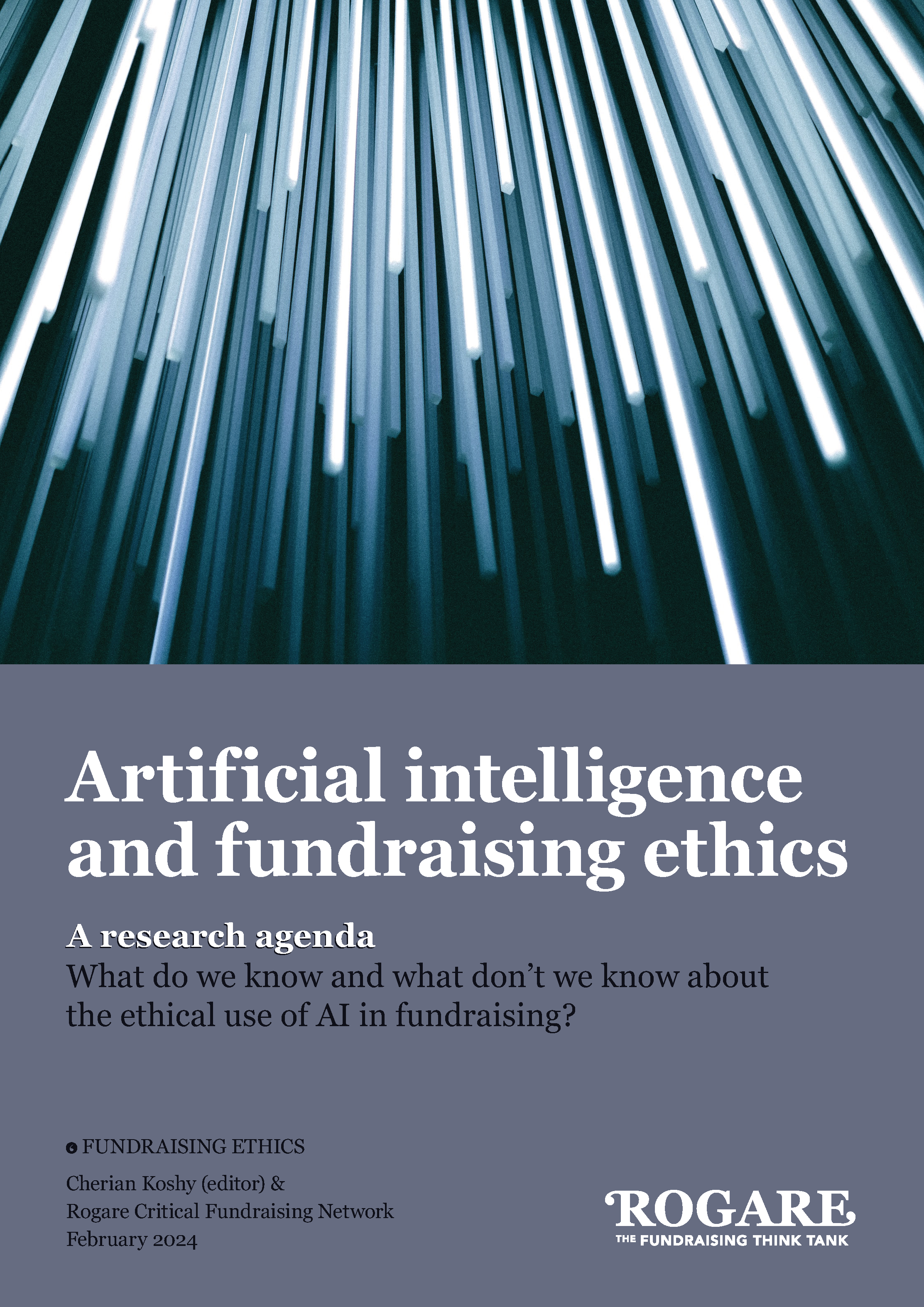- Home
- About Us
- The Team / Contact Us
- Books and Resources
- Privacy Policy
- Nonprofit Employer of Choice Award

Artificial intelligence (AI) offers exciting opportunities for charities and nonprofits, from automating administrative tasks to gaining insights from data. However, consideration of how it should be used in fundraising has focused mainly on practical applications, with less thought given to the ethical implications that might arise from its use.
When attention does turn to the ethics of using AI for fundraising, the focus is often on how generic ethical issues about AI might also apply to fundraising. But AI will throw up ethical issues and challenges that are unique to fundraising and the nonprofit sector.
A Rogare project team, led by US fundraising consultant Cherian Koshy, has considered what some of these fundraising-specific ethical issues are, and developed a research agenda to explore what else we need to know to rise to these challenges.
 This is an excerpt from that report.
This is an excerpt from that report.
Beyond a narrow focus
In December 2022, a Canadian charity, Furniture Bank in Toronto, claimed to have “solved” the poverty porn dilemma using AI. The charity used AI to create images of beneficiaries without photographing real people, arguing this protected beneficiaries’ dignity. However, did this really resolve the ethical dilemma? Or did it bring to the surface even more ethical issues arising from AI’s entry into fundraising.
This is highly relevant given fundraising’s traditional focus on functional skills over normative ethics. Collectively, the fundraising profession has historically been more concerned with the practical aspects of raising money, such as developing effective marketing campaigns, than with the ethical implications of these activities – on what fundraisers can do, but not whether they ought to do it.
With public scrutiny of fundraising ethics growing, AI risks exacerbating problems around over-solicitation, intrusive tactics, and transparency. This is because AI can be used to automate many aspects of fundraising, including identifying potential donors, contacting them, and soliciting donations, with a potential to undermine public trust in fundraising organizations if these are not done appropriately.
Constructing an ethical AI framework is essential to maintain public trust. This framework should include principles such as transparency, accountability, and respect for donor privacy. It should also ensure that AI is used in a way that is consistent with the values of the fundraising organization. By adopting an ethical AI framework, fundraising organizations can help to ensure that AI is used in a way that is beneficial to both donors and the organizations themselves, and ultimately the beneficiaries those organizations help.
The way the fundraising sector has been thinking about the ethics of AI in fundraising is to consider generic concerns about AI and then assume that these apply to fundraising in much the same way that the apply to other sectors.
But, might there be other ethical issues that come from the use of AI in fundraising that have not yet been contemplated, issues that are unique to using AI in fundraising? That’s what this project will consider.
This raises an important distinction in how we approach the ethics of AI in fundraising, with two key research questions:
1. What ethical issues are associated with using AI in fundraising?
Beyond concerns such dignity and stereotyping that exist irrespective of AI, there may be novel ethical considerations that emerge specifically from the use of artificial intelligence and automation in fundraising. For example, who owns and controls the data sources powering AI systems? How does the “black box” nature of algorithmic decision-making impact transparency and accountability? Could AI lead to greater exclusion or discrimination through encoded biases? What are the second-order effects on the environment and employment?
2. Can AI be used to resolve ethical dilemmas in fundraising?
Fundraising dilemmas often involve balancing different stakeholder perspectives and rights. But does AI have sufficient understanding of fundraising ethics and normative frameworks to make nuanced ethical judgments? Or could over-reliance on AI for decision-making lead to narrow, technical approaches lacking human wisdom? More research is needed on the limits of AI in contextualizing principles and values when navigating tricky real-world scenarios.
Investigating these two questions will be essential as the fundraising profession adopts new AI capabilities. Doing so from the outset, rather than retrofitting solutions, will help maintain public trust and focus innovation on serving social good.
The project team’s findings and recommendations can be found in the full report published in February 2024 – Artificial intelligence and fundraising ethics: A research agenda.
To talk about the research agenda and this project, contact Cherian Koshy at cheriangkoshy@gmail.com. For further information about Rogare, contact director Ian MacQuillin at ianmacquillin@rogare.net.